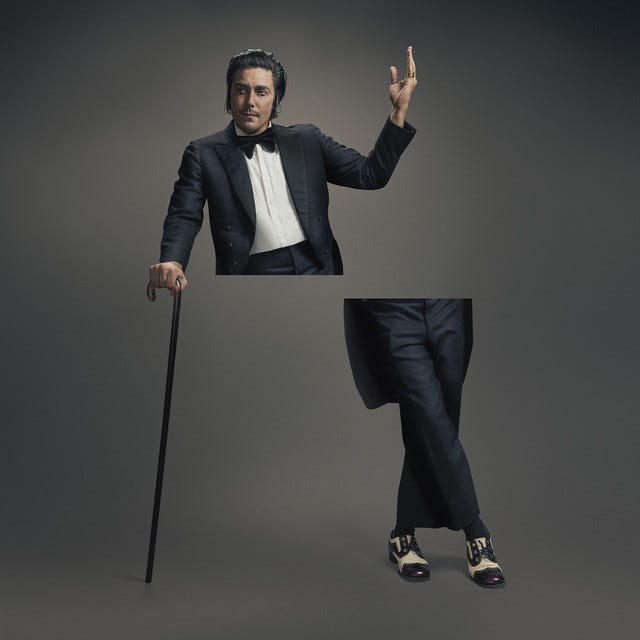Brooks Nielsen Hopes We Don't Remember
The Growlers' former frontman's solo album pretends nothing happened

This is an extra edition of The Catch focused on music, Sunday’s analysis piece will continue as scheduled
CW: Sexual assault
Twenty tracks.
In the summer of 2020, after the pandemic had spread through North America, allegations came out against many bands involved in the so-cal garage rock scene, the centre of which was a label called Burger Records. Tales of sexual assault, rape and more were levied against artists like Nobunny, SWMRS, The Black Lips, The Buttertones and many more. One of these bands was The Growlers.
First, claims were made about frontman Brooks Nielsen groping a female journalist and the guitarist Matt Taylor committing rape. Their initial response was denying these allegations and pointing out that these claims were anonymous. After this, the Starcrawlers’ Arrow De Wilde publicly stated that The Growlers had hired a male stripper to force her down and wave his genitals in her face, sexually assaulting her while the band recorded on their phones and laughed. At this point, Matt Taylor took temporary leave of the band, still denying the rape allegation, and Nielsen apologized for “juvenile, idiotic and cruel” antics that The Growlers took part in. One of these things he was apologizing for was, presumably, a 2009 interview where Nielsen said “If I did what I felt, I’d be fucking sixteen year olds.”
Twenty tracks.
I was a huge fan of The Growlers, and this all cut deeply. The safety of young women and other targeted groups in music scenes obviously takes precedence, so I did what I could. I made a video on it for my channel, I spread the news far and wide, I spoke with friends who enjoyed these bands to inform them, and I stopped listening. If I’m being honest with myself, there’s still a void in my musical tastes that no other band has filled. Their nostalgia-laden production and songwriting was unique and felt genuine, rather than the typical nostalgia bait I abhor. Seeing them live was a great feeling at the time as well. Unfortunately it’s all been stained with their behaviour and their reactions to being called out for their behaviour. This isn’t to say you’re a bad person if you still listen to their music, but it’s something I can’t do anymore.
Flash forward to December, 2022. While browsing my socials and keeping an eye out for any concerts I think are worth venturing into the plague for, I see the Horseshoe Tavern post that Brooks Nielsen is coming to play on April 21st. “Gee, that’s weird,” I thought, “does he have any songs outside of The Growlers?”
That’s when I learned that yes, he did. Nielsen released One Match Left on June 3rd of this year, a solo album of twenty tracks. Eight of which have been released as singles, two with additional remixes.
Twenty tracks.
The attempt to break out from the shadows and return to music after predatory behaviour was exposed shouldn’t be discounted out of hand. The deck is stacked to be sure, but perhaps the work has been done on Nielsen’s side. He did announce he would work with counseling and donate to Times Up East Los Angeles Women’s Center. Arrow De Wilde hasn’t commented, nor should she be badgered and reminded of a traumatic event in her life in every interview, but that doesn’t mean the work wasn’t done. I tried to enter One Match Left with an open mind. Unfortunately, as you may have noticed, there was twenty tracks.
I’m very much of the mind that a single project needs to be as tight as possible, while still showcasing the range of songwriting an artist has in their repertoire that fits a cohesive theme. This usually means that after 11 or 12 tracks my brain starts to glaze over, unless the dynamic moods and songwriting skills justify the album’s length. So twenty is a hard sell even in the best of times.

Indeed, this project absolutely doesn’t merit twenty songs, as the songwriting remains very mid-tempo and relatively similar throughout. “The same old song, with a different name,” for example, are not lyrics you should be presenting front-and-centre sixteen songs into this album that’s barely shifted from “slow song” to “mid-tempo song” over the hour and five minute run time.
Nielsen’s themes and vocal tenor haven’t shifted much from his time in The Growlers either. This is an issue, considering how tied to sexual misconduct that mood and art is now. True, it’s possible to move past that artistically while still keeping to your roots, but this would require some sort of artistic reckoning with the situation. Art is meant to convey honest emotion, and an honest reflection of past behaviour through your music is a viable option. However, the closest Nielsen gets to acknowledging his misdeeds are a handful of self-pitying diatribes that hope to motivate the listener to move out of hard times. This would fit for a singer like Sean Bonnette, but Sean Bonnette isn’t releasing a double-album after being publicly exposed for facilitating sexual assault and laughing at the victim.
If I were a producer on this album, for example, I would advise that the opening track “All That You’ll See Is Everything” not start with the words “Nobody cares about me when I'm down.” Sir, the public’s last memory of you was not pity for your feelings not being validated, it was you being a key part in someone else’s sexual assault. The Other Press did a great dissection of this single in particular, but this lack of self-awareness spreads throughout the rest of the album. Hopeless romantic crooning around reggae beats and reverb is a tough sell when we’re all aware that you’ve openly admitted to wanting to commit statuatory rape.
This can’t be explained better than examining the song which he literally named “Lo Siento.” Spanish for “I’m sorry,” it literally translates to “I feel it.” So if any song were to be about his role in sexual misconduct and the empathy he’s forced himself to feel, this would be it, correct? Well it doesn’t appear to be the case. The opening lines describe Nielsen holding in all these dark feelings, and keeping a loved one at bay to “protect” them. The chorus’ main refrain is then “Lo Siento, I couldn’t see, all the love was right in front of me.”
I don’t believe Nielsen meant to intentionally evoke the Burger Records reckoning in his lyrical themes, but it inevitably hangs over the album like a dark cloud. Moments like reminiscing about city living and how he prefers country life in City of Cheer smacks of sour grapes whether or not he intends it. “I’m a country man now, the city gets old,” I’m sure it does, Nielsen. I wonder why? In “Life Ain’t a Riddle” Nielsen croons to a young, naive unnamed person he’s giving advice to. “They say you can’t just do what you want to, that is the crack in the polished boot” and other lyrics convey how life is only complicated if you live it for someone else. Brooks, if you lived life how you wanted… well… we know what you said you’d do.
Finally, and I can’t stress this enough, “I’m going to eat my words, no regret” are not the lyrics you end a comeback album with after that debacle.
Are there good songs and musical choices in the project? Of course. Nielsen couldn’t have gotten this far in his career if there weren’t genuine moments of catchy vocal lines, heart-string tugging progressions or warm, evocative production. But the issue in listening to Nielsen’s latest offering isn’t whether you think individual tracks are good or not, it’s whether you think he’s earned his way back into the ears of the indie music community. Like it or not, that’s the position that Nielsen inevitably puts himself in by returning with a new release and no outside interviews or announcements examining his past. Nielsen isn’t opening himself up about what changes have happened since 2020 in his music or outside of it, and promotion is either nonexistent or completely avoids the subject of why The Growlers are on hiatus entirely.
Again, this is not a blanket condemnation of anyone who listens to the music of The Growlers or Nielsen, but at the very least we have to have the conversation. As of right now, all that speaks to Nielsen’s reckoning with the past is this album. If that’s what he wanted, then it sounds like he wants us to move on without acknowledgement. Considering it took six months for me to notice he had a solo album out and there’s little to no press coverage, it seems the public has moved on… just not in the way Nielsen hoped.





